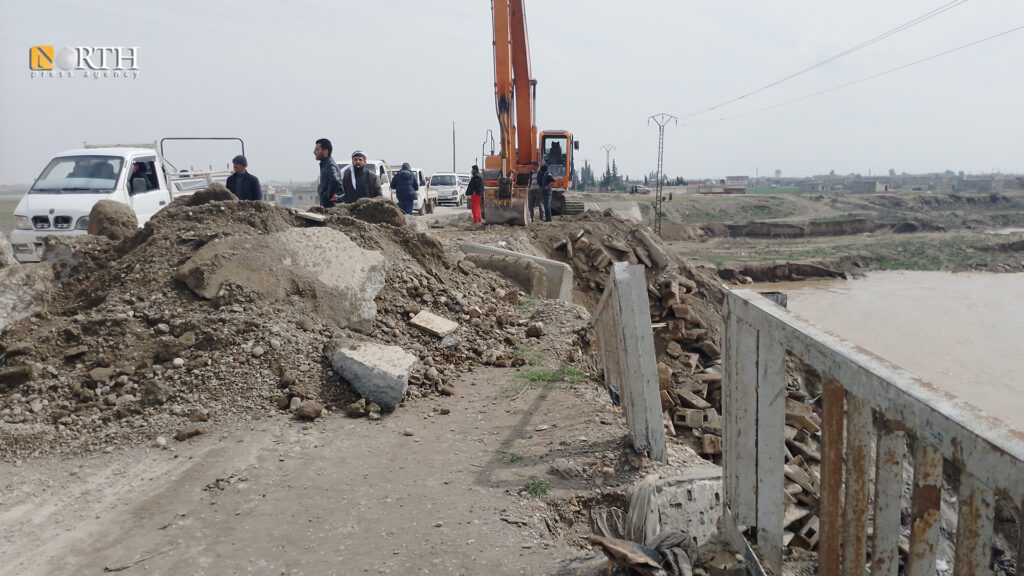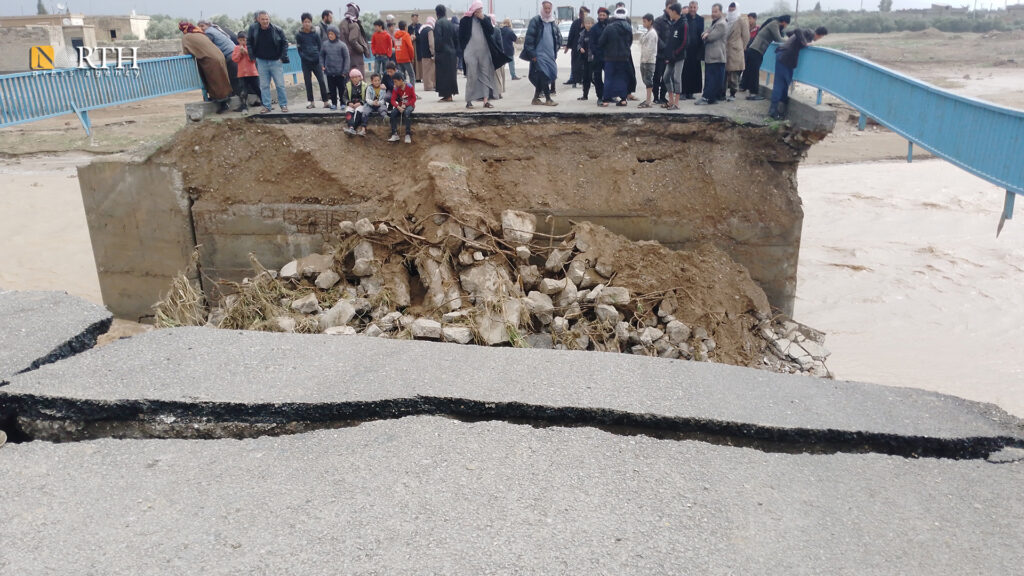RAQQA, Syria (North Press) – It has become difficult for al-Isawi to reach his farmland by car after several bridges were damaged and collapsed in recent rain torrents and floods that swept the eastern countryside of Raqqa, northern Syria, forcing him to either walk on foot or drive his car on a longer road if necessary.
Ali al-Isawi, 45, from the village of Abu Sussa, 60 km north of al-Karama, is forced to drive five kilometers with his car to get to his land. Prior to the destruction of a bridge, leading to his land, he used to drive for only 200 meters to reach it.
More than a month ago, heavy rainfall in Syria caused floods that put vital service and agriculture bridges out of service, crippling the life of locals and farmers.
After the bridge was destroyed, al-Isawi along with 70 other farmers were not able to reach their lands by cars.
The collapse of the agriculture bridge in the village of Abu Sussa, which is one of the main agriculture bridges that serve farmers to get to their lands and oversee the progress of crops, aggravated the suffering of the farmers.

The Local Administration and Municipalities Board, affiliated with the Autonomous Administration of North and East Syria (AANES), restored some partially damaged bridges, whereas agricultural ones were not restored.
The AANES was first formed in 2014 in the Kurdish-majority regions of Afrin, Kobani and Jazira in northern Syria following the withdrawal of the government forces. Later, it was expanded to Manbij, Tabqa, Raqqa, Hasakah and Deir ez-Zor after the SDF defeated ISIS militarily there.
In mid-March, al-Hawas bridge partially collapsed and was out of service due to floods that hit the region, however, the bridge was “urgently” restored in a primitive way, putting it at risk of collapse again.
As for the bridge on the Balikh River, which is a vital and key bridge for the movement of the locals and located in al-Raqqa al-Samrah east of the city, it was put out of service due to the same rain torrents and was restored later.
Mahmoud al-Shanan, 46, a farmer from the town of al-Hawas, 60 km east of Raqqa, complains about the destruction of bridges in the floods that makes it hard for them to reach their lands.
Despite the “simple” demands, as he put it, made to concerned officials in the agriculture sector to restore the destroyed bridges, his demands have not been met.
The floods and rain torrents put nine bridges out of service in the eastern countryside, including two service bridges and seven agricultural ones.
The service bridges, such as al-Shaher and al-Raqqa al-Samrah, were restored, but the agricultural bridges remained damaged.
In the town of al-Karama and its countryside, five bridges were damaged, while two bridges in al-Hawas were damaged.
Al-Shanan said that their demands were not approved under the pretext of a shortage in budget.
According to al-Shanan, an official responsible for repairing bridges asked farmers to depend on themselves in fixing the bridges.
However, due to the farmers’ dire economic and living conditions, they cannot repair those bridges at their own expense as a result of the high prices of materials, not to mention buying them in the USD, where one dollar equals 9,000 Syrian Pounds (SYP).
Faysel al-Bayrem, co-chair of the al-Karama Municipality, said that the Local Administration and Municipalities Board repaired the service bridges due to their significance. As for agricultural ones, they are in the jurisdiction of the Agriculture and Aggregation Committee.

Al-Bayrem said, “Even though we sent more than five official correspondences, they have not been responded.”
He called on the Agriculture and Aggregation Committee to restore and repair all the destroyed bridges, especially since harvest season is approaching and the damaged bridges will deter them from reaching their lands.
It is worth mentioning that there are 130 bridges in Raqqa and its countryside, 60 of which were either partially or completely damaged due to battles that occurred in the region between different parties, according to substantive services committee in Raqqa Civil Council.
Islamic State (ISIS) controlled Raqqa and its countryside between January 2014 and October 2017, naming Raqqa the capital of the Caliphate.
October 2017 marked the end of the ISIS Caliphate in the city following fierce battles between ISIS and the Syrian Democratic Forces (SDF).

